Applying Systems Thinking to Childhood Obesity: A PUBH6003 Report
VerifiedAdded on 2022/08/24
|6
|1843
|18
Report
AI Summary
This report examines the application of systems thinking to address the complex public health issue of childhood obesity. It emphasizes the importance of participatory systems dynamics in the development, implementation, and evaluation of systems thinking approaches. The report highlights the need for broad leadership, stakeholder interaction, and the consideration of diverse factors such as social, physical, cultural, and financial aspects. It analyzes the roles of various stakeholders, including healthcare professionals, family members, and school teachers, and identifies obstacles to effective implementation, such as lack of coordination and resistance to change. The report also stresses the importance of community engagement and the need for sustainable efforts to prevent childhood obesity. The report concludes by recommending that more effort be put into making systems thinking approaches more sustainable and that community-based approaches be used in managing childhood obesity in children.

Health Systems and Economics
1
1
Paraphrase This Document
Need a fresh take? Get an instant paraphrase of this document with our AI Paraphraser
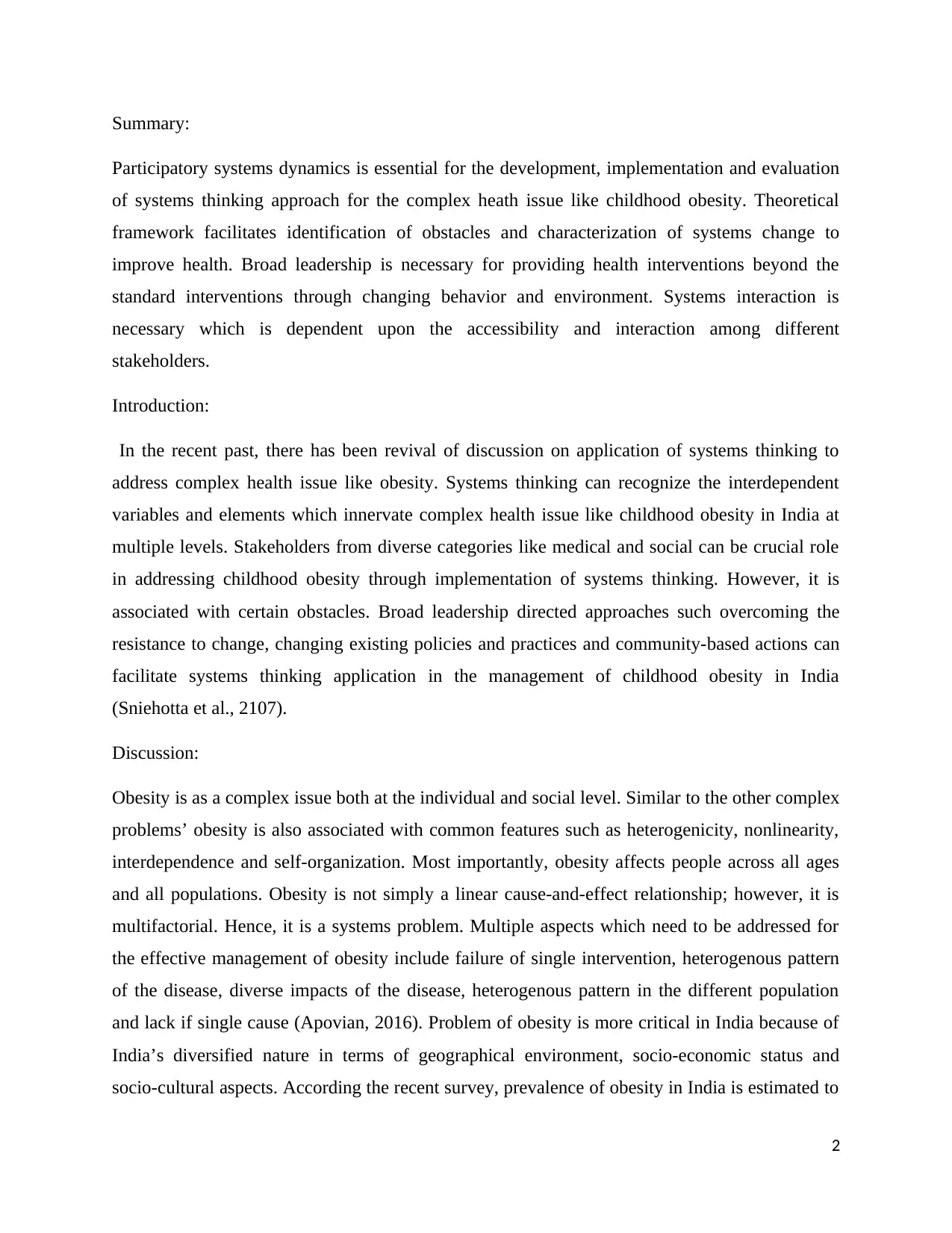
Summary:
Participatory systems dynamics is essential for the development, implementation and evaluation
of systems thinking approach for the complex heath issue like childhood obesity. Theoretical
framework facilitates identification of obstacles and characterization of systems change to
improve health. Broad leadership is necessary for providing health interventions beyond the
standard interventions through changing behavior and environment. Systems interaction is
necessary which is dependent upon the accessibility and interaction among different
stakeholders.
Introduction:
In the recent past, there has been revival of discussion on application of systems thinking to
address complex health issue like obesity. Systems thinking can recognize the interdependent
variables and elements which innervate complex health issue like childhood obesity in India at
multiple levels. Stakeholders from diverse categories like medical and social can be crucial role
in addressing childhood obesity through implementation of systems thinking. However, it is
associated with certain obstacles. Broad leadership directed approaches such overcoming the
resistance to change, changing existing policies and practices and community-based actions can
facilitate systems thinking application in the management of childhood obesity in India
(Sniehotta et al., 2107).
Discussion:
Obesity is as a complex issue both at the individual and social level. Similar to the other complex
problems’ obesity is also associated with common features such as heterogenicity, nonlinearity,
interdependence and self-organization. Most importantly, obesity affects people across all ages
and all populations. Obesity is not simply a linear cause-and-effect relationship; however, it is
multifactorial. Hence, it is a systems problem. Multiple aspects which need to be addressed for
the effective management of obesity include failure of single intervention, heterogenous pattern
of the disease, diverse impacts of the disease, heterogenous pattern in the different population
and lack if single cause (Apovian, 2016). Problem of obesity is more critical in India because of
India’s diversified nature in terms of geographical environment, socio-economic status and
socio-cultural aspects. According the recent survey, prevalence of obesity in India is estimated to
2
Participatory systems dynamics is essential for the development, implementation and evaluation
of systems thinking approach for the complex heath issue like childhood obesity. Theoretical
framework facilitates identification of obstacles and characterization of systems change to
improve health. Broad leadership is necessary for providing health interventions beyond the
standard interventions through changing behavior and environment. Systems interaction is
necessary which is dependent upon the accessibility and interaction among different
stakeholders.
Introduction:
In the recent past, there has been revival of discussion on application of systems thinking to
address complex health issue like obesity. Systems thinking can recognize the interdependent
variables and elements which innervate complex health issue like childhood obesity in India at
multiple levels. Stakeholders from diverse categories like medical and social can be crucial role
in addressing childhood obesity through implementation of systems thinking. However, it is
associated with certain obstacles. Broad leadership directed approaches such overcoming the
resistance to change, changing existing policies and practices and community-based actions can
facilitate systems thinking application in the management of childhood obesity in India
(Sniehotta et al., 2107).
Discussion:
Obesity is as a complex issue both at the individual and social level. Similar to the other complex
problems’ obesity is also associated with common features such as heterogenicity, nonlinearity,
interdependence and self-organization. Most importantly, obesity affects people across all ages
and all populations. Obesity is not simply a linear cause-and-effect relationship; however, it is
multifactorial. Hence, it is a systems problem. Multiple aspects which need to be addressed for
the effective management of obesity include failure of single intervention, heterogenous pattern
of the disease, diverse impacts of the disease, heterogenous pattern in the different population
and lack if single cause (Apovian, 2016). Problem of obesity is more critical in India because of
India’s diversified nature in terms of geographical environment, socio-economic status and
socio-cultural aspects. According the recent survey, prevalence of obesity in India is estimated to
2
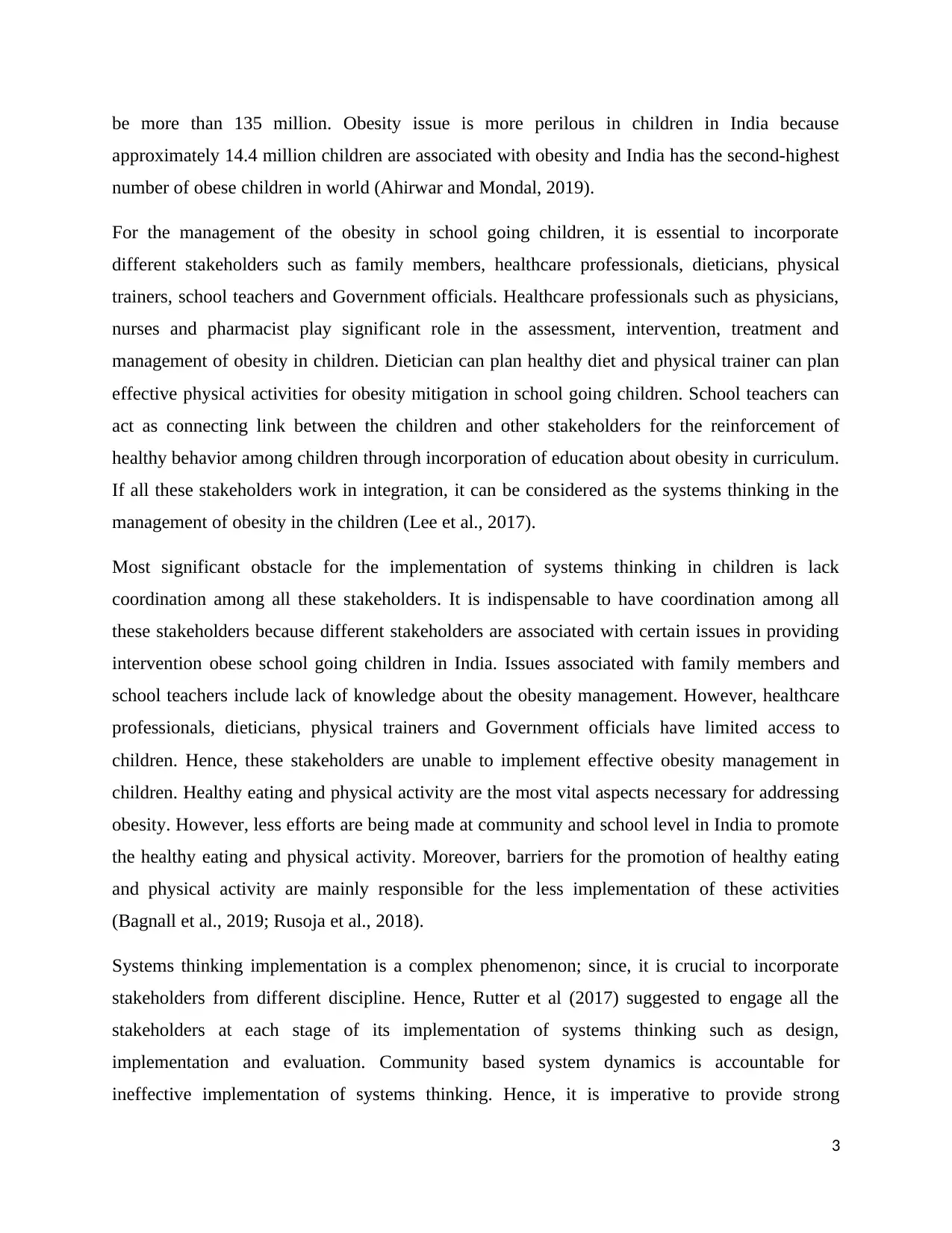
be more than 135 million. Obesity issue is more perilous in children in India because
approximately 14.4 million children are associated with obesity and India has the second-highest
number of obese children in world (Ahirwar and Mondal, 2019).
For the management of the obesity in school going children, it is essential to incorporate
different stakeholders such as family members, healthcare professionals, dieticians, physical
trainers, school teachers and Government officials. Healthcare professionals such as physicians,
nurses and pharmacist play significant role in the assessment, intervention, treatment and
management of obesity in children. Dietician can plan healthy diet and physical trainer can plan
effective physical activities for obesity mitigation in school going children. School teachers can
act as connecting link between the children and other stakeholders for the reinforcement of
healthy behavior among children through incorporation of education about obesity in curriculum.
If all these stakeholders work in integration, it can be considered as the systems thinking in the
management of obesity in the children (Lee et al., 2017).
Most significant obstacle for the implementation of systems thinking in children is lack
coordination among all these stakeholders. It is indispensable to have coordination among all
these stakeholders because different stakeholders are associated with certain issues in providing
intervention obese school going children in India. Issues associated with family members and
school teachers include lack of knowledge about the obesity management. However, healthcare
professionals, dieticians, physical trainers and Government officials have limited access to
children. Hence, these stakeholders are unable to implement effective obesity management in
children. Healthy eating and physical activity are the most vital aspects necessary for addressing
obesity. However, less efforts are being made at community and school level in India to promote
the healthy eating and physical activity. Moreover, barriers for the promotion of healthy eating
and physical activity are mainly responsible for the less implementation of these activities
(Bagnall et al., 2019; Rusoja et al., 2018).
Systems thinking implementation is a complex phenomenon; since, it is crucial to incorporate
stakeholders from different discipline. Hence, Rutter et al (2017) suggested to engage all the
stakeholders at each stage of its implementation of systems thinking such as design,
implementation and evaluation. Community based system dynamics is accountable for
ineffective implementation of systems thinking. Hence, it is imperative to provide strong
3
approximately 14.4 million children are associated with obesity and India has the second-highest
number of obese children in world (Ahirwar and Mondal, 2019).
For the management of the obesity in school going children, it is essential to incorporate
different stakeholders such as family members, healthcare professionals, dieticians, physical
trainers, school teachers and Government officials. Healthcare professionals such as physicians,
nurses and pharmacist play significant role in the assessment, intervention, treatment and
management of obesity in children. Dietician can plan healthy diet and physical trainer can plan
effective physical activities for obesity mitigation in school going children. School teachers can
act as connecting link between the children and other stakeholders for the reinforcement of
healthy behavior among children through incorporation of education about obesity in curriculum.
If all these stakeholders work in integration, it can be considered as the systems thinking in the
management of obesity in the children (Lee et al., 2017).
Most significant obstacle for the implementation of systems thinking in children is lack
coordination among all these stakeholders. It is indispensable to have coordination among all
these stakeholders because different stakeholders are associated with certain issues in providing
intervention obese school going children in India. Issues associated with family members and
school teachers include lack of knowledge about the obesity management. However, healthcare
professionals, dieticians, physical trainers and Government officials have limited access to
children. Hence, these stakeholders are unable to implement effective obesity management in
children. Healthy eating and physical activity are the most vital aspects necessary for addressing
obesity. However, less efforts are being made at community and school level in India to promote
the healthy eating and physical activity. Moreover, barriers for the promotion of healthy eating
and physical activity are mainly responsible for the less implementation of these activities
(Bagnall et al., 2019; Rusoja et al., 2018).
Systems thinking implementation is a complex phenomenon; since, it is crucial to incorporate
stakeholders from different discipline. Hence, Rutter et al (2017) suggested to engage all the
stakeholders at each stage of its implementation of systems thinking such as design,
implementation and evaluation. Community based system dynamics is accountable for
ineffective implementation of systems thinking. Hence, it is imperative to provide strong
3
⊘ This is a preview!⊘
Do you want full access?
Subscribe today to unlock all pages.

Trusted by 1+ million students worldwide
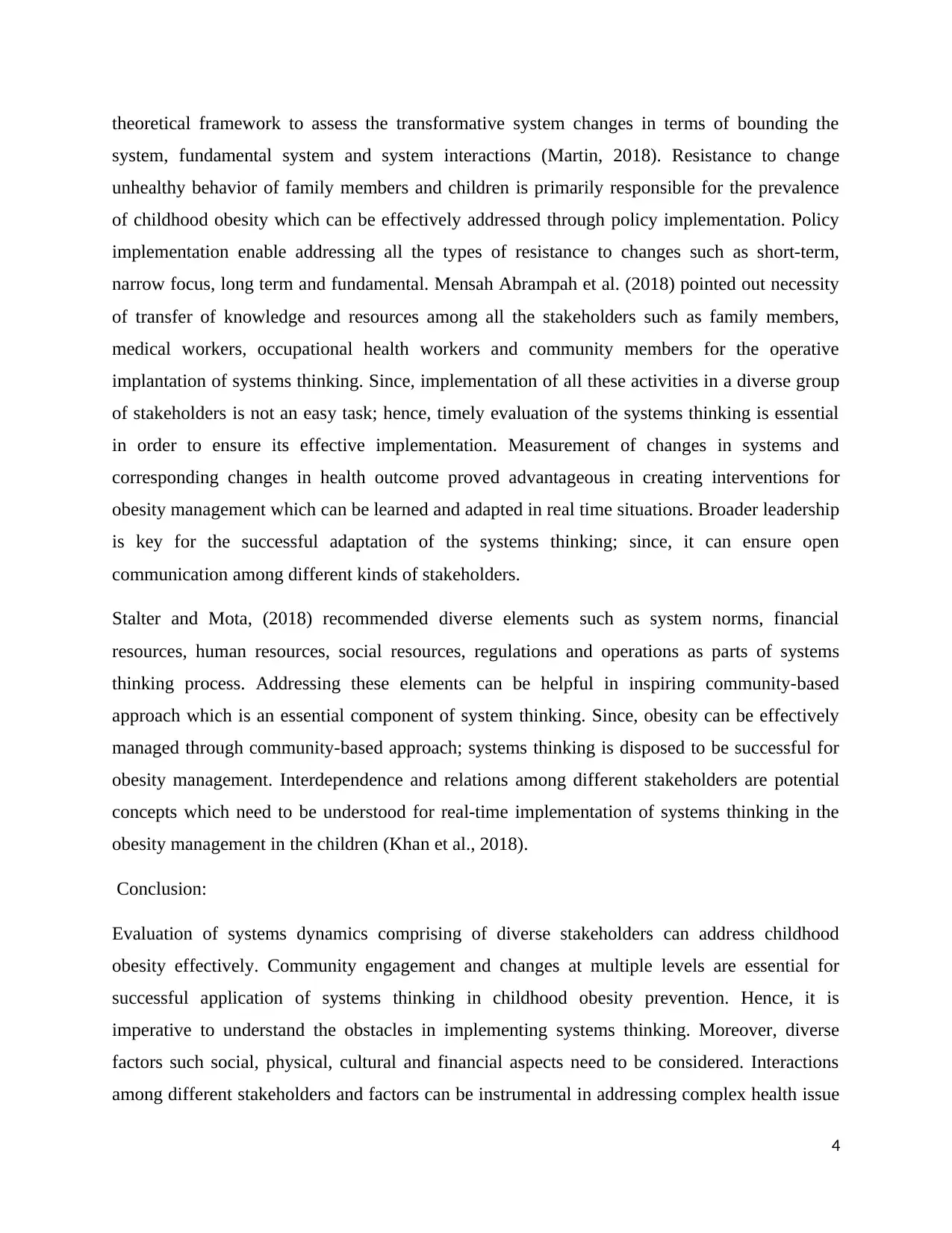
theoretical framework to assess the transformative system changes in terms of bounding the
system, fundamental system and system interactions (Martin, 2018). Resistance to change
unhealthy behavior of family members and children is primarily responsible for the prevalence
of childhood obesity which can be effectively addressed through policy implementation. Policy
implementation enable addressing all the types of resistance to changes such as short-term,
narrow focus, long term and fundamental. Mensah Abrampah et al. (2018) pointed out necessity
of transfer of knowledge and resources among all the stakeholders such as family members,
medical workers, occupational health workers and community members for the operative
implantation of systems thinking. Since, implementation of all these activities in a diverse group
of stakeholders is not an easy task; hence, timely evaluation of the systems thinking is essential
in order to ensure its effective implementation. Measurement of changes in systems and
corresponding changes in health outcome proved advantageous in creating interventions for
obesity management which can be learned and adapted in real time situations. Broader leadership
is key for the successful adaptation of the systems thinking; since, it can ensure open
communication among different kinds of stakeholders.
Stalter and Mota, (2018) recommended diverse elements such as system norms, financial
resources, human resources, social resources, regulations and operations as parts of systems
thinking process. Addressing these elements can be helpful in inspiring community-based
approach which is an essential component of system thinking. Since, obesity can be effectively
managed through community-based approach; systems thinking is disposed to be successful for
obesity management. Interdependence and relations among different stakeholders are potential
concepts which need to be understood for real-time implementation of systems thinking in the
obesity management in the children (Khan et al., 2018).
Conclusion:
Evaluation of systems dynamics comprising of diverse stakeholders can address childhood
obesity effectively. Community engagement and changes at multiple levels are essential for
successful application of systems thinking in childhood obesity prevention. Hence, it is
imperative to understand the obstacles in implementing systems thinking. Moreover, diverse
factors such social, physical, cultural and financial aspects need to be considered. Interactions
among different stakeholders and factors can be instrumental in addressing complex health issue
4
system, fundamental system and system interactions (Martin, 2018). Resistance to change
unhealthy behavior of family members and children is primarily responsible for the prevalence
of childhood obesity which can be effectively addressed through policy implementation. Policy
implementation enable addressing all the types of resistance to changes such as short-term,
narrow focus, long term and fundamental. Mensah Abrampah et al. (2018) pointed out necessity
of transfer of knowledge and resources among all the stakeholders such as family members,
medical workers, occupational health workers and community members for the operative
implantation of systems thinking. Since, implementation of all these activities in a diverse group
of stakeholders is not an easy task; hence, timely evaluation of the systems thinking is essential
in order to ensure its effective implementation. Measurement of changes in systems and
corresponding changes in health outcome proved advantageous in creating interventions for
obesity management which can be learned and adapted in real time situations. Broader leadership
is key for the successful adaptation of the systems thinking; since, it can ensure open
communication among different kinds of stakeholders.
Stalter and Mota, (2018) recommended diverse elements such as system norms, financial
resources, human resources, social resources, regulations and operations as parts of systems
thinking process. Addressing these elements can be helpful in inspiring community-based
approach which is an essential component of system thinking. Since, obesity can be effectively
managed through community-based approach; systems thinking is disposed to be successful for
obesity management. Interdependence and relations among different stakeholders are potential
concepts which need to be understood for real-time implementation of systems thinking in the
obesity management in the children (Khan et al., 2018).
Conclusion:
Evaluation of systems dynamics comprising of diverse stakeholders can address childhood
obesity effectively. Community engagement and changes at multiple levels are essential for
successful application of systems thinking in childhood obesity prevention. Hence, it is
imperative to understand the obstacles in implementing systems thinking. Moreover, diverse
factors such social, physical, cultural and financial aspects need to be considered. Interactions
among different stakeholders and factors can be instrumental in addressing complex health issue
4
Paraphrase This Document
Need a fresh take? Get an instant paraphrase of this document with our AI Paraphraser
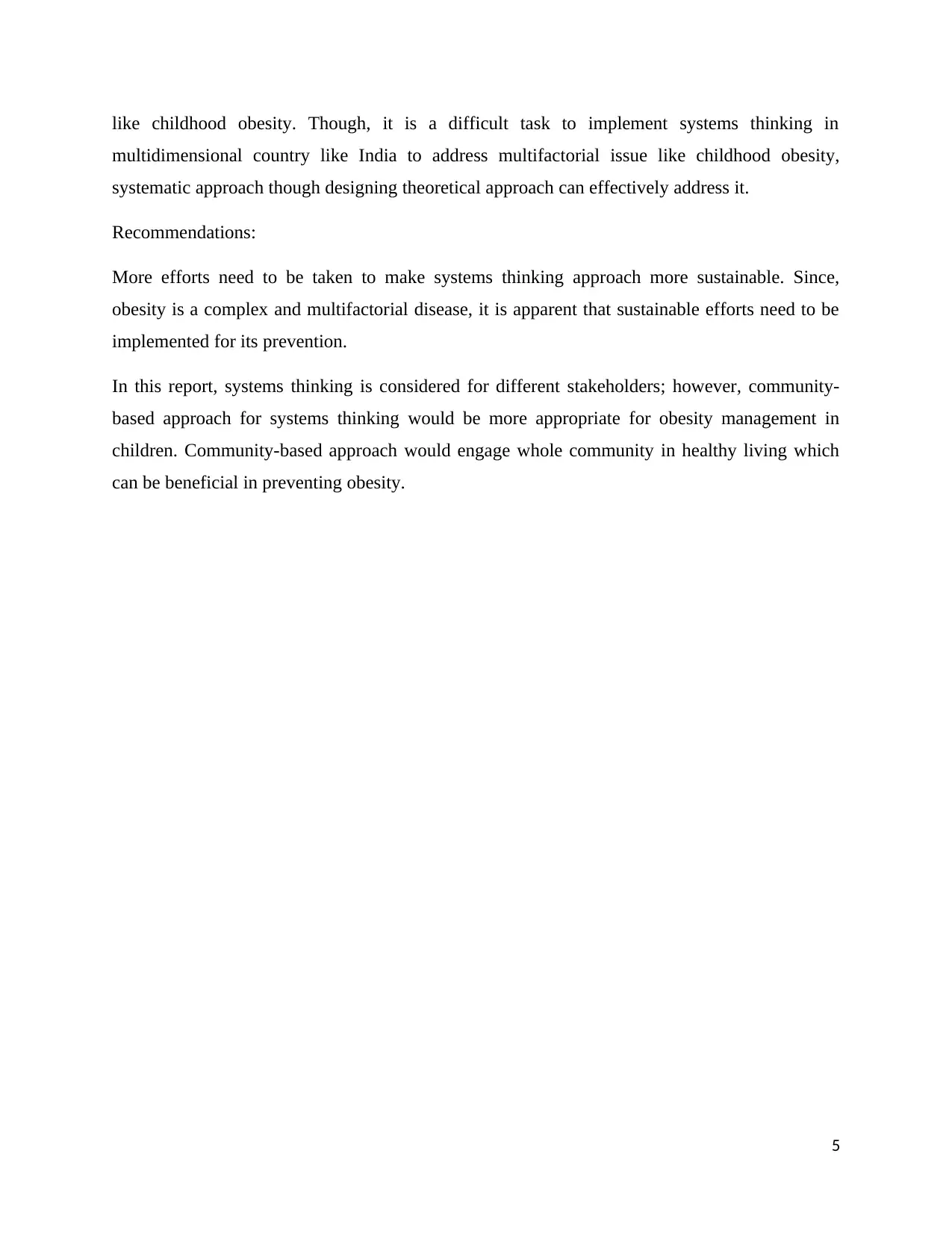
like childhood obesity. Though, it is a difficult task to implement systems thinking in
multidimensional country like India to address multifactorial issue like childhood obesity,
systematic approach though designing theoretical approach can effectively address it.
Recommendations:
More efforts need to be taken to make systems thinking approach more sustainable. Since,
obesity is a complex and multifactorial disease, it is apparent that sustainable efforts need to be
implemented for its prevention.
In this report, systems thinking is considered for different stakeholders; however, community-
based approach for systems thinking would be more appropriate for obesity management in
children. Community-based approach would engage whole community in healthy living which
can be beneficial in preventing obesity.
5
multidimensional country like India to address multifactorial issue like childhood obesity,
systematic approach though designing theoretical approach can effectively address it.
Recommendations:
More efforts need to be taken to make systems thinking approach more sustainable. Since,
obesity is a complex and multifactorial disease, it is apparent that sustainable efforts need to be
implemented for its prevention.
In this report, systems thinking is considered for different stakeholders; however, community-
based approach for systems thinking would be more appropriate for obesity management in
children. Community-based approach would engage whole community in healthy living which
can be beneficial in preventing obesity.
5
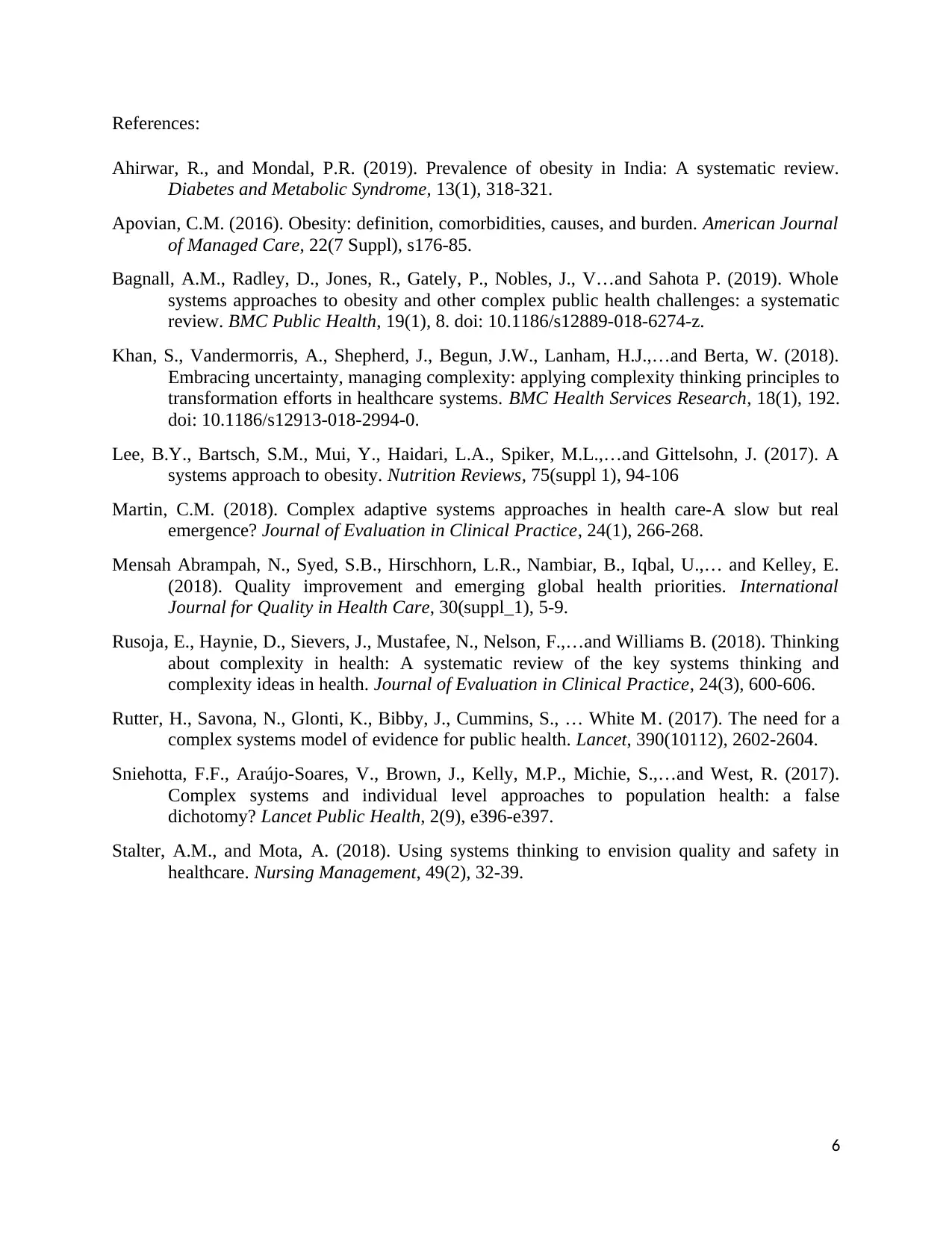
References:
Ahirwar, R., and Mondal, P.R. (2019). Prevalence of obesity in India: A systematic review.
Diabetes and Metabolic Syndrome, 13(1), 318-321.
Apovian, C.M. (2016). Obesity: definition, comorbidities, causes, and burden. American Journal
of Managed Care, 22(7 Suppl), s176-85.
Bagnall, A.M., Radley, D., Jones, R., Gately, P., Nobles, J., V…and Sahota P. (2019). Whole
systems approaches to obesity and other complex public health challenges: a systematic
review. BMC Public Health, 19(1), 8. doi: 10.1186/s12889-018-6274-z.
Khan, S., Vandermorris, A., Shepherd, J., Begun, J.W., Lanham, H.J.,…and Berta, W. (2018).
Embracing uncertainty, managing complexity: applying complexity thinking principles to
transformation efforts in healthcare systems. BMC Health Services Research, 18(1), 192.
doi: 10.1186/s12913-018-2994-0.
Lee, B.Y., Bartsch, S.M., Mui, Y., Haidari, L.A., Spiker, M.L.,…and Gittelsohn, J. (2017). A
systems approach to obesity. Nutrition Reviews, 75(suppl 1), 94-106
Martin, C.M. (2018). Complex adaptive systems approaches in health care-A slow but real
emergence? Journal of Evaluation in Clinical Practice, 24(1), 266-268.
Mensah Abrampah, N., Syed, S.B., Hirschhorn, L.R., Nambiar, B., Iqbal, U.,… and Kelley, E.
(2018). Quality improvement and emerging global health priorities. International
Journal for Quality in Health Care, 30(suppl_1), 5-9.
Rusoja, E., Haynie, D., Sievers, J., Mustafee, N., Nelson, F.,…and Williams B. (2018). Thinking
about complexity in health: A systematic review of the key systems thinking and
complexity ideas in health. Journal of Evaluation in Clinical Practice, 24(3), 600-606.
Rutter, H., Savona, N., Glonti, K., Bibby, J., Cummins, S., … White M. (2017). The need for a
complex systems model of evidence for public health. Lancet, 390(10112), 2602‐2604.
Sniehotta, F.F., Araújo‐Soares, V., Brown, J., Kelly, M.P., Michie, S.,…and West, R. (2017).
Complex systems and individual level approaches to population health: a false
dichotomy? Lancet Public Health, 2(9), e396‐e397.
Stalter, A.M., and Mota, A. (2018). Using systems thinking to envision quality and safety in
healthcare. Nursing Management, 49(2), 32-39.
6
Ahirwar, R., and Mondal, P.R. (2019). Prevalence of obesity in India: A systematic review.
Diabetes and Metabolic Syndrome, 13(1), 318-321.
Apovian, C.M. (2016). Obesity: definition, comorbidities, causes, and burden. American Journal
of Managed Care, 22(7 Suppl), s176-85.
Bagnall, A.M., Radley, D., Jones, R., Gately, P., Nobles, J., V…and Sahota P. (2019). Whole
systems approaches to obesity and other complex public health challenges: a systematic
review. BMC Public Health, 19(1), 8. doi: 10.1186/s12889-018-6274-z.
Khan, S., Vandermorris, A., Shepherd, J., Begun, J.W., Lanham, H.J.,…and Berta, W. (2018).
Embracing uncertainty, managing complexity: applying complexity thinking principles to
transformation efforts in healthcare systems. BMC Health Services Research, 18(1), 192.
doi: 10.1186/s12913-018-2994-0.
Lee, B.Y., Bartsch, S.M., Mui, Y., Haidari, L.A., Spiker, M.L.,…and Gittelsohn, J. (2017). A
systems approach to obesity. Nutrition Reviews, 75(suppl 1), 94-106
Martin, C.M. (2018). Complex adaptive systems approaches in health care-A slow but real
emergence? Journal of Evaluation in Clinical Practice, 24(1), 266-268.
Mensah Abrampah, N., Syed, S.B., Hirschhorn, L.R., Nambiar, B., Iqbal, U.,… and Kelley, E.
(2018). Quality improvement and emerging global health priorities. International
Journal for Quality in Health Care, 30(suppl_1), 5-9.
Rusoja, E., Haynie, D., Sievers, J., Mustafee, N., Nelson, F.,…and Williams B. (2018). Thinking
about complexity in health: A systematic review of the key systems thinking and
complexity ideas in health. Journal of Evaluation in Clinical Practice, 24(3), 600-606.
Rutter, H., Savona, N., Glonti, K., Bibby, J., Cummins, S., … White M. (2017). The need for a
complex systems model of evidence for public health. Lancet, 390(10112), 2602‐2604.
Sniehotta, F.F., Araújo‐Soares, V., Brown, J., Kelly, M.P., Michie, S.,…and West, R. (2017).
Complex systems and individual level approaches to population health: a false
dichotomy? Lancet Public Health, 2(9), e396‐e397.
Stalter, A.M., and Mota, A. (2018). Using systems thinking to envision quality and safety in
healthcare. Nursing Management, 49(2), 32-39.
6
⊘ This is a preview!⊘
Do you want full access?
Subscribe today to unlock all pages.

Trusted by 1+ million students worldwide
1 out of 6
Related Documents
Your All-in-One AI-Powered Toolkit for Academic Success.
+13062052269
info@desklib.com
Available 24*7 on WhatsApp / Email
![[object Object]](/_next/static/media/star-bottom.7253800d.svg)
Unlock your academic potential
Copyright © 2020–2025 A2Z Services. All Rights Reserved. Developed and managed by ZUCOL.





